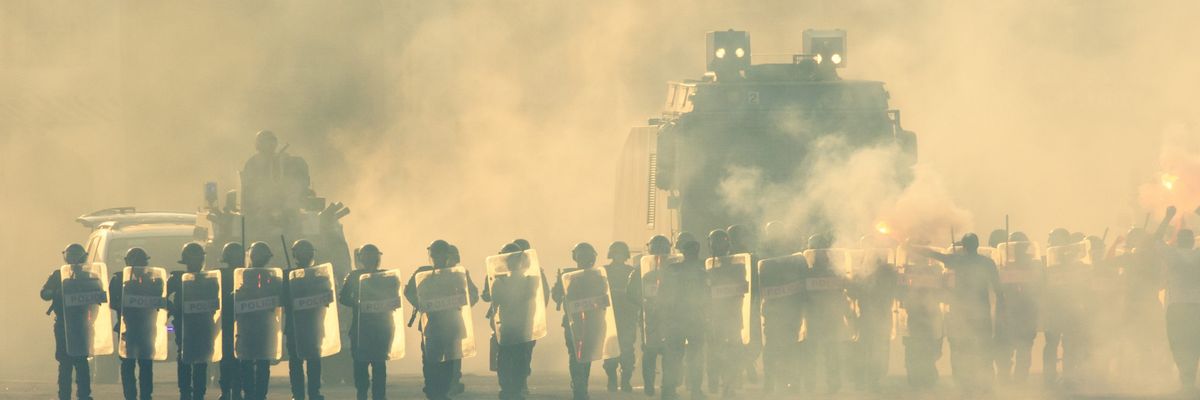As democratic uprisings spread like wildfire across the Middle East in 2011 and 2012, the United Arab Emirates experienced its own milder form of the Arab Spring.
Secular intellectuals and Islamist groups joined together in March 2011 to craft a petition for greater political representation in Emirati politics. After witnessing the fall of regimes across the region, Abu Dhabi responded by conducting the largest crackdown in Emirati history — arresting, jailing, banning, and exiling practically all involved parties. After the crackdown, the monarchical regime framed the incident as a state initiative to quell violent extremism and to prevent terrorism from infiltrating its borders.
The episode illustrates how the UAE has managed to frame its suppression of domestic dissent and its interventionist military campaigns as counterterrorism initiatives, feeding the international community a distorted image of its participation in the so-called “ war on terror.”
Washington is eating it up. Despite Abu Dhabi’s increasingly politically repressive behavior, the United States continues to provide a broad range of security and political support to the UAE, demonstrating an inherent support of its actions. As the Trump administration moves closer towards selling 50 F-35 fighter jets to the UAE following its cooperation in the Abraham Accords, U.S. regulators should be cognizant of Abu Dhabi’s motivations and role in regional security.
The UAE’s perception of political dissent as a threat to the regime strongly influences its national security agenda. Criticism of the regime stems from a range of domestic democratic voices and academics, and human rights advocates around the world.. In particular, this stream of dissent is popular with marginalized Emiratis due to its emphasis on faith and criticism of Gulf social policies.
In 2011, the opposition, which was composed of both religious and secular academic leaders, signaled to the regime that the threat of democratic forces was growing too strong, and Abu Dhabi was losing its grip over the national consensus. In the government’s eyes, if left unchecked, political dissent could unravel the very fabric of the regime.
The United States’ emphasis on the “war on terror” enabled a convenient justification for Abu Dhabi to pursue domestic political repression. Citizens have privately accused the government of monitoring private communications and organizations under the guise of state protection from terrorism. International human rights defenders have documented unethical detention and corrupt court practices, some of which have landed political figures in prison for decades. Yet, there has been little outrage from the United States because the UAE claims to abide by the U.S. national security priority of “defeating” violent extremism..
The UAE also aligns its interventionist campaigns with U.S. counterterrorism initiatives in the region, which has enabled it to pursue its authoritarian policies on a regional scale. Abu Dhabi has supported military campaigns in favor of like-minded regimes in Yemen, Somalia, and Libya, in efforts to curb the development of political groups that reflect the views of anti-government entities within the Emirates. Critics have noted that Emirati military campaigns to ostensibly counter extremist groups have resulted in serious human rights violations and war crimes. But yet again, as long as Abu Dhabi cites counterterrorism as its objective, they can indiscriminately conduct warfare with little U.S. objection.
As the Emirates progressively become more involved in regional and global initiatives, it reinforces its security alliance with Washington. In a sense, the U.S. does not contest Abu Dhabi’s agenda because it mirrors its own indiscriminate militarism in the region, as critiqued through this Center for International Policy report of U.S. arms sales.
The nature of Washington’s security relationship with the UAE should come under even greater scrutiny as the Trump administration draws even closer to Abu Dhabi in the wake of the UAE’s unprecedented diplomatic agreement with Israel. While discussing the newly formalized diplomatic relations, President Trump has praised Abu Dhabi’s deepened involvement in the region as a pivotal moment for peace and stability in the Middle East. But at what cost? The agreement risks cementing America’s security relationship with Abu Dhabi without addressing its efforts to preserve the regional status quo.
U.S. lawmakers and officials should reflect on the monarchy’s political repression in the context of U.S. policy in the Middle East, to ensure that the U.S. does not also misconduct counterterrorism and execute terror instead.
Sydney Boer is a Researcher at the Center for International Policy’s (CIP) Security Assistance Monitor.

















